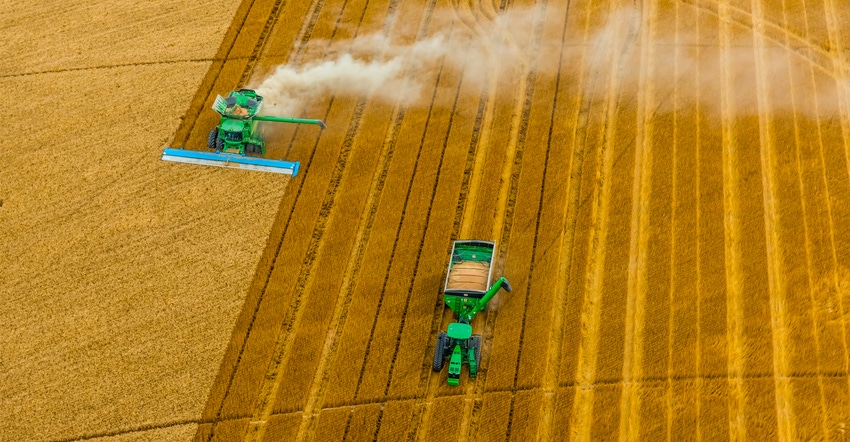
Logically, as grain prices rise, so should competition for rental ground on the market, and that may mean arguably higher rental rates in 2021, says Robin Reid, Kansas State University Extension farm economist.
On May 12, Reid joined Allen Featherstone, head of the KSU Department of Agricultural Economics, for a webinar on Kansas land values.
Featherstone says we’re seeing a paradigm shift in commodity prices, with wheat, corn, sorghum and soybean prices all nearly doubled from their 2020 lows. The market is expecting to ease back a little bit over the next four years, he adds.
Reid says with these higher commodity prices and net farm income levels, one might expect land rental rates to match their rise. However, rental rates change slowly because most lease agreements are negotiated on a long-term basis.
“Back when we had $7 corn in 2010 to 2014, and good profitability and good grain prices, at the state level, nonirrigated ground rented for just over $40 an acre and has just recently risen now to $55 an acre,” she says. “Since then, rental rates have remained fairly flat. Back when we had $3 and $4 corn, there was no decline in cash rental rates.” Reid advises farmers to expect with these new commodity prices to see a modest jump in rental rates when they go to their landlords to negotiate the next agreement.
Featherstone says the market views ag lending to be very safe in the next few years.
“Real interest rates are low, and that’s pushing money into other places from treasuries,” Featherstone says. “Inflation expectations are increasing, though.”
He adds that now might be a good time to lock in lower interest rates for longer financing of assets. Unlike the 1980s, there’s still expected profitability in the agricultural sector, and land values are expected to remain steady.
Featherstone says overall, investing in land is still a good opportunity. But, there may be some non-farming heirs looking to sell land to get out from any proposed capital gains taxes. And that may put more land on the market.
“If there’s more supply of land out there, that may equalize the supply and demand for land, and we may not see a runup on land values that we would otherwise see,” he says. However, those heirs selling land would then also have to find a place to park that money from converting land to cash — and not many investments can provide the return like agricultural land.
Cloud and Washington counties
About 104.97 irrigated acres and 168.77 dryland crop acres, with the balance in grass and wildlife habitat, were sold at auction March 24 for $1.69 million. The water right is in good standing on Tract 1, with an allocation of 108 acre-feet at 765 gallons per minute. All tillable acres are well-maintained, mostly Class I and II soils with a productive history. All tracts are close to Clyde, Kan., with highway frontage. The seller was the Brian C. Foster Supplemental Care Trust. Farmers National Co. handled the sale.
Finney County
Two nice Conservation Reserve Program quarters of 313.6 acres, with productive soils and good crop production potential on Highway 156 in northeast Finney County, sold by bid April 20, for $658,560. The CRP contract expires in 2022. The sellers were Darren McElfresh and Brian P. McElfresh, trustees of the Karen Rixon McElfresh Separate Property Trust. Farmers National Co. handled the sale.
Lane County
About 960 acres of cropland and CRP sold in Lane County on auction May 18 in six tracts. Tracts 1 to 5 were planted to wheat or will be planted to sorghum this spring by the tenant. They sold for $2,000 to $2,450 per acre, depending on the tract. Tract 6 is enrolled in CRP until this fall, and it sold for $2,150 per acre. The seller was the estate of Janice L. Murphy. Farm & Ranch Realty Inc., Colby, Kan., handled the sale.
McPherson County
About 143.1 acres of dryland with mostly Class II soils near Canton, Kan., sold at auction March 30 for $608,175. The tract is south of Canton along a blacktop road, and there is immediate access for a 2021 crop. The sellers were the Lyon Morehead Trust and John Morehead Trust. Farmers National Co. handled the sale.
Rooks County
About 300 acres of grass and cropland near Woodston, Kan., sold at auction April 23 in two tracts. Tract 1 had 26 acres in growing wheat, with the balance of the tract in grass, with live water and a pond. It sold for $1,350 per acre. Tract 2 was grassland with a rural water tap; it sold for $1,075 per acre. The seller was Barbara Garton. Farm & Ranch Realty Inc., Colby, Kan., handled the sale.
Sherman County
One tract of about 80 acres of cultivated and open cropland ready for spring planting, near Edson, Kan., sold at auction May 26 for $2,450 per acre. The sellers were Cleve and Mellanie Trachsel. Farm & Ranch Realty Inc., Colby, Kan., handled the sale.
Stanton and Hamilton counties
About 320 acres of cropland and producing mineral rights in Stanton and Hamilton counties sold at auction May 25. Tracts 1 and 2, in Stanton County, included surface and mineral rights, respectively. Tract 1 sold for $1,250 per acre. Tract 2 sold for $19,000. Tract 3, in Hamilton County, did not include mineral rights, and sold for $1,200 per acre. The Willis family was the seller. Farm & Ranch Realty Inc., Colby, Kan., handled the sale.
About the Author(s)
You May Also Like






